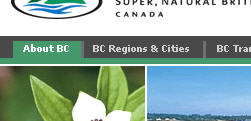March 2005
The Archives
-
Uncategorized
Great Viral Marketing Example
Expedia Canada has a promotion that’s great example of a smart way to increase their marketing intelligence. They’re running a contest where consumers can win a trip they build themselves. In the meantime of course, Expedia learns about the individual preferences so they can personalize and target future communications. They also have a clever way to grow their database by encouraging people to invite their friends to enter the contest. Well done, and I’ll forgive them for the Flash.
-
tourism bc
Coming soon: a brand new HelloBC.com
 Friday we started the UAT process for our new website. It was amazing to see every we’ve worked so hard on for two years come together. It’s going to be great. Keep your browser pointed to HelloBC.com mid April and see for yourself why British Columbia is worth a visit.
Friday we started the UAT process for our new website. It was amazing to see every we’ve worked so hard on for two years come together. It’s going to be great. Keep your browser pointed to HelloBC.com mid April and see for yourself why British Columbia is worth a visit. -
Uncategorized
Personalized Google News

Google just updated Google News with a personalization component. This is very nice, I added a “travel website” section. I can now remove my email alert. I’m impressed by the interface, but what Google should add is an RSS feed to Google News, then I would happy.
-
Uncategorized
Google eyetracking study; organic matters
An interesting eyetracking study was conducted about Google’s result page. The results are predictable but that doesn’t make it less interesting. Anything below the 5th position in the organic rankings receives less than 50% visibility. That was also the fold by the way. The top sponsored ad receives 50%, down to 10% for the 5th spot and below. Focussing on organic remains important.
The map indicating where users viewed the web page is also interesting. Maybe just because I’m jealous I haven’t been able to this for any of our websites yet. But I’m going to work on it.
-
tourism bc
Work with me here
Are you a web citizen? Is the User Experience your passion? Do you know the ins and outs in Search Engine Optimization and online marketing? Do you like the tourism business? Do you agree that Vancouver is a fantastic place to live? Then why don’t you check out our job posting and come work with me!
-
Uncategorized
Snap: Innovative or Crazy?
Little known Search Engine Snap.com has been around for almost 6 months. It has a very interesting business model. It’s based on conversion and transparency.
First, Snap has introduced a Cost-Per-Action advertising model. An advertiser only pays when a user does a specific action. This can be a purchase, or a form submission, or something else that’s meaningful to the advertiser. The higher the conversion, the better placement an advertiser gets. Makes sense, most advertisers measure this anyways and Google offers a tool to track conversion so why not base your model on it? The search results are determined by the conversion rate. The rational is that the higher the conversion, the more relevant the website. Very similar to the Overture approach what worked well for searches for products and services.
Secondly, Snap is very transparent in all this. The search results show the user how much an advertiser pays and what their conversion is. So a user can see how valuable their business is to the advertiser, and therefore, how relevant. I haven’t seen a conversion rate on any search results I’ve seen but Snap doesn’t get very many searches yet (75,000/day, Google receives millions). Snap is transparent about their whole business model. Click on stats on you can create all kinds of interesting reports including popular keywords, traffic, advertiser specifics and Snaps financials. Very interesting.
And third, Snap has an interesting product search as well. Search for Digital Camera, for example and a special search results show where the user can filter and sort the results. They use similar technology as Google is experimenting where user input immediately results in action without a service call. Jesse James Garrett has coined the term Ajax for it.
I like what Snap is doing. It uses a model a lot of companies use for measuring advertising and transparency users will appreciate. Call Snap crazy, but it’s run by the same people who created Overture, who introduced pay-per-click bidding and sold the company for 1.7 billion to Yahoo. Question is if users will adopt this over the big guns Google, MSN, Yahoo or Ask. Probably not likely. The key will be in syndication their search results. That’s what made Overture a success.

